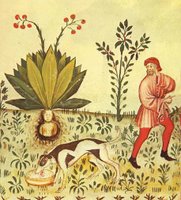
Tuesday, March 06, 2007
The Daily Hump: Falafel
 I love chickpeas. I love hummus. I love falafel. Falafel comes from the Arabic falāfil, which is the plural of filfil, meaning "pepper". It's likely that this word is related to the Sanskrit pippalī (long pepper), which comes from the Sanskrit pippalam, and referred to the pipal, a fig tree native to India. Incidentally, this is the same species of tree Siddhartha Gautama was sitting underneath when he became enlightened. That's one spicy Buddha.
I love chickpeas. I love hummus. I love falafel. Falafel comes from the Arabic falāfil, which is the plural of filfil, meaning "pepper". It's likely that this word is related to the Sanskrit pippalī (long pepper), which comes from the Sanskrit pippalam, and referred to the pipal, a fig tree native to India. Incidentally, this is the same species of tree Siddhartha Gautama was sitting underneath when he became enlightened. That's one spicy Buddha.Our word pepper is from this same root via the Old English pipor, Latin piper and Greek peperi.
pepper [AHD]
falafel [AHD]
pipal [AHD]
pepper [Online Etymology Dictionary]
sacred fig [Wikipedia]
Labels: Arabic, Greek, Latin, Old English, Sanskrit, The Daily Hump
Tuesday, October 03, 2006
The Daily Hump: Sitars and Guitars
About 6 weeks ago I began taking Persian. It's an amazingly beautiful and logically constructed language that shares numerous ancient Indo-European roots with our modern English. Like when learning any language, one of the first things you do is count to 10:
yêk, do, sé, chahâr, panj, shesh, haft, hasht, no, dah
 This leads us to the first of today's words. Thanks to the early works of George Harrison, the sitar, originally of northern Indian origin, has become a fairly recognizable instrument in the West. The word sitar is, however, purely Persian and comes from the words sé (three) and tar (string). Per Wikipedia:
This leads us to the first of today's words. Thanks to the early works of George Harrison, the sitar, originally of northern Indian origin, has become a fairly recognizable instrument in the West. The word sitar is, however, purely Persian and comes from the words sé (three) and tar (string). Per Wikipedia:
 Upon learning the etymology of sitar in class last night I immediately drew a connection to guitar. Guitar seems to share the tar (string) root, which would make sense, but what is the gui- portion? Again, Wikipedia:
Upon learning the etymology of sitar in class last night I immediately drew a connection to guitar. Guitar seems to share the tar (string) root, which would make sense, but what is the gui- portion? Again, Wikipedia:
yêk, do, sé, chahâr, panj, shesh, haft, hasht, no, dah
 This leads us to the first of today's words. Thanks to the early works of George Harrison, the sitar, originally of northern Indian origin, has become a fairly recognizable instrument in the West. The word sitar is, however, purely Persian and comes from the words sé (three) and tar (string). Per Wikipedia:
This leads us to the first of today's words. Thanks to the early works of George Harrison, the sitar, originally of northern Indian origin, has become a fairly recognizable instrument in the West. The word sitar is, however, purely Persian and comes from the words sé (three) and tar (string). Per Wikipedia: A similar instrument is used to this day in Afghanistan, and the original Persian name is still used. Both instruments are most likely derived from the Kurdish tembûr, which is a long, lute-like instrument with no gourd resonating chamber. Both the tembûr and sehtar were used in pre-Islamic Persia and are used in Iran today.For whatever reason the instrument gained strings when adopted into Indian culture.
 Upon learning the etymology of sitar in class last night I immediately drew a connection to guitar. Guitar seems to share the tar (string) root, which would make sense, but what is the gui- portion? Again, Wikipedia:
Upon learning the etymology of sitar in class last night I immediately drew a connection to guitar. Guitar seems to share the tar (string) root, which would make sense, but what is the gui- portion? Again, Wikipedia: The modern word, guitar, was adopted into English from Spanish guitarra, derived from earlier Greek word kithara. Prospective sources for various names of musical instruments that guitar could be derived from appear to be a combination of two Indo-European roots: guit-, similar to Sanskrit sangeet meaning "music", and -tar a widely attested root meaning "chord" or "string".Per the OED, guitar first made it into the English language in the 14th century, in the form of gittern. You may also be interested to note that the Greek kithara (cithara) is responsible for our English word zither.
The word guitar may be a Persian loanword to Iberian Arabic. The word qitara is an Arabic name for various members of the lute family that preceded the Western guitar. The name guitarra was introduced into Spanish when such instruments were brought into Iberia by the Moors after the 10th century.
Labels: Arabic, Greek, Kurdish, Persian, Spanish, The Daily Hump
Friday, September 15, 2006
The Daily Hump: Mating Season
 We all know what a stalemate is. In chess this is a result when the person whose turn it is has no allowable moves and their king is not in check. More figuratively, a stalemate refers to any situation which ends in a draw. Likewise, when a stalemate occurs in chess the game is drawn. Before we delve into the etymology, I think it's interesting to note that a stalemate did not always result in no winner. Per the OED,
We all know what a stalemate is. In chess this is a result when the person whose turn it is has no allowable moves and their king is not in check. More figuratively, a stalemate refers to any situation which ends in a draw. Likewise, when a stalemate occurs in chess the game is drawn. Before we delve into the etymology, I think it's interesting to note that a stalemate did not always result in no winner. Per the OED,In England from the 17th c. to the beginning of the 19th c. the player who received stalemate won the game. Various other rules have been in vogue at different times; sometimes the player giving stalemate won, either wholly or to the extent of half the stake; sometimes the last few moves had to be played over again until a mate resulted; sometimes the piece causing the obstruction was removed.Up until the 18th c. the situation we now call a stalemate was simply known as a stale. For whatever reason the word mate was later appended as a suffix. It's generally believed that the word stale harkens back to the Old French estaler (to come to a standstill). Mate is simply a shortened form of checkmate, and a stalemate could not logically involve a checkmate, thus the word stalemate is a misnomer. On a side note, estaler was adopted into Middle English and spawned our modern verb stall.
Our modern word checkmate comes from the Middle English checkmat which was from the Old French eschec mat which goes back even further to the Arabic šāh māt, literally "the king is dead." The Arabic šāh, meaning "king", was borrowed from the Persian shāh--a title that was used by the monarchs of Iran, most recently by the leader deposed in the 1979 Iranian Revolution.
The plural form of checkmate's Old French ancestor, eschec mat is esches. In Middle English esches was shortened to simply ches, which is where, of course, we find our word for the game itself, chess.
Thus, linguistically speaking, chess is truly the game of kings.
stalemate [OED]
checkmate [OED]
Labels: Arabic, Middle English, Old French, Persian, The Daily Hump
Friday, August 25, 2006
The Daily Hump: Mandrake

"Shrieks like mandrakes' torn out of the earth." - Shakespeare: Romeo and Juliet, iv. m3.Machiavelli used it for the title and theme of a play (Mandragola). Shakespeare mentions it in not just Romeo and Juliet, but Othello, Antony and Cleopatra and King Henry VI. DH Lawrence called it the "weed of ill-omen"; Ezra Pound and JK Rowling write of its magical properties (Portrait d'Une Femme and Harry Potter and the Chamber of Secrets, guess who wrote which).
The mandrake is the common name for members of the plant genus Mandragora, which is part of the nightshades family. Found mainly around the Mediterranean, the Mandragora officinarum has a short stem with a solitary purple or whitish flower. It's rather obvious to see that the word mandragora comes from the roots man + dragon. Mandrake is simply a Middle English alteration of mandragora which heralds from Old English, back to Latin, mandragorā, and then earlier to Greek. (Drake and dragon share a common Latin root dracō).
 Per the OED, the mandrake
Per the OED, the mandrake ...was formerly credited with magical and medicinal properties esp. because of the supposedly human shape of its forked fleshy root, being used to promote conception, and was reputed to shriek when pulled from the ground and to cause the death of whoever uprooted it....This connection with fertility can be seen in the Hebrew word for mandrake, דודאים, which literally translates as "love plant." The Arabs refer to the plant as beid el-jinn--"genie's eggs". This ability to create life yet also cause death is also reflected in the common legend that mandrakes are seeded by the semen of hanged men. Samuel Beckett references this myth in Waiting for Godot.
Estragon: Wait.Alas, man's best friend was left with the dangerous duty of harvesting the plant. As Jewish historian Josephus chronicled,
Vladimir: Yes, but while waiting.
Estragon: What about hanging ourselves?
Vladimir: Hmm. It'd give us an erection.
Estragon: (highly excited) An erection!
Vladimir: With all that follows. Where it falls mandrakes grow. That's why they shriek when you pull them up. Did you not know that?
Estragon: Let's hang ourselves immediately!
a furrow must be dug around the root until its lower part is exposed, then a dog is tied to it, after which the person tying the dog must get away. The dog then endeavours to follow him, and so easily pulls up the root, but dies suddenly instead of his master. After this the root can be handled without fear.Mandrake (plant) [Wikipedia]
Mandrake [The American Heritage® Dictionary of the English Language, Fourth Edition]
Labels: Arabic, Hebrew, Latin, Middle English, Old English, Shakespeare, The Daily Hump
Wednesday, August 23, 2006
The Daily Hump: Serendipity
 ser·en·dip·i·ty (sĕr'ən-dĭp'ĭ-tē)
ser·en·dip·i·ty (sĕr'ən-dĭp'ĭ-tē)n.Usage note: Serendip should not be confused with sarin dip. In fact, if you find yourself around a sarin dip it's most likely not serendipity.
1. The faculty of making fortunate discoveries by accident.
2. The fact or occurrence of such discoveries.
3. An instance of making such a discovery.
We are indebted to the English author Horace Walpole for the word serendipity, which he coined in one of the 3,000 or more letters on which his literary reputation primarily rests. In a letter of January 28, 1754, Walpole says that "this discovery, indeed, is almost of that kind which I call Serendipity, a very expressive word." Walpole formed the word on an old name for Sri Lanka, Serendip. He explained that this name was part of the title of "a silly fairy tale, called The Three Princes of Serendip: as their highnesses traveled, they were always making discoveries, by accidents and sagacity, of things which they were not in quest of...."
[From the characters in the Persian fairy tale The Three Princes of Serendip, who made such discoveries, from Persian Sarandīp, Sri Lanka, from Arabic sarandīb.]
[The American Heritage® Dictionary of the English Language, Fourth Edition]
 Sarin's etymology is rather interesting in itself:
Sarin's etymology is rather interesting in itself:Sarin was discovered in 1938 in Wuppertal-Elberfeld in the Ruhr valley of Germany by two German scientists while attempting to create stronger pesticides; it is the most toxic of the four G-agents made by Germany. The compound, which followed the discovery of the nerve agent tabun, was named in honor of its discoverers: Gerhard Schrader, Ambros, Rüdiger and Van der LINde.Suggested reading:
The Three Princes of Serendip [The Living Heritage Trust]
The Three Princes of Serendip [Wikipedia]
Sarin [Wikipedia]
Labels: Arabic, Persian, The Daily Hump
Monday, August 21, 2006
Whither, Cuneiform?

Not to go down a particular track, 'specially in consideration of the last post, but since we've covered ourselves with Shit, we may as well move onto, into everyone's favorite: Cunt. Obviously - and boringly - offensive to us, the word is thrown around by the Brits and the Micks with less meaning than a 3 penny tip to your local barista. But for us its eh..eh..a big deal, no? Call a girl a cunt and she'll without a doubt want to feed you your balls. Call some guy a cunt - particularly effective when you append with something like "dickless" - only if you're ready to throw down; or feel - because he really is both those things - you won't have to.
Still, why draw a line in the sand on a word that is complimentary at best and of questionable origin at worst. Who knows.
Mathew Hunt, a guy who clearly has smoked the good shit, knows. Matt tracked the word - in his weird and highly subjective (you're clearly into some freaky shit, Matt, but thats fine by me) devotes a good bit of effort tracking the word from Indo-European to Celtic to Dutch. His findings, while questionable scientifically (I just like saying that), offer us a rarified peek into the cu...word.:
The prefix 'cu' is an expression of "quintessential femineity" (Eric Partridge, 1961), confirming 'cunt' as a truly feminine term. The synonymy between 'cu' and femininity was in place even before the development of written language: "in the unwritten prehistoric Indo-European [...] languages 'cu' or 'koo' was a word base expressing 'feminine', 'fecund' and associated notions" (Tony Thorne, 1990). The proto-Indo-European 'cu' is also cognate with other feminine/vaginal terms, such as the Hebrew 'cus'; the Arabic 'cush', 'kush', and 'khunt'; the Nostratic 'kuni' ('woman'); and the Irish 'cuint' ('cunt').There you have it. The cunt unraveled.
Thus, 'cu' and 'koo', both pronounced 'coo', were ancient monosyllabic sounds implying femininity. 'Coo' and 'cou' are modern slang terms for vagina, based on these ancient sounds. Other vaginal slang words, such as 'cooch', 'coot', 'cooter', 'cooz', 'cooze', 'coozie', 'coozy', 'cookie', 'choochy', 'chocha', 'cootch', and 'coochie snorcher' are extensions of them. 'Coochie snorcher', as in The Little Coochie Snorcher That Could from The Vagina Monologues, is a childish euphemism for 'cunt' that has generated the following elaborate variants:
'hootchy-kootchy'
'hootchie-kootchie'
'hootchie-cootchie'
'hootchy-cootchy'
'hoochie-coochie'
'ootchimagootchi'
'ouchimagooga'.
Cuntinue
Cunt: A Cultural History [MatthewHunt.com]
Labels: Arabic, Guest Hump, Hebrew, Irish Gaelic, PIE